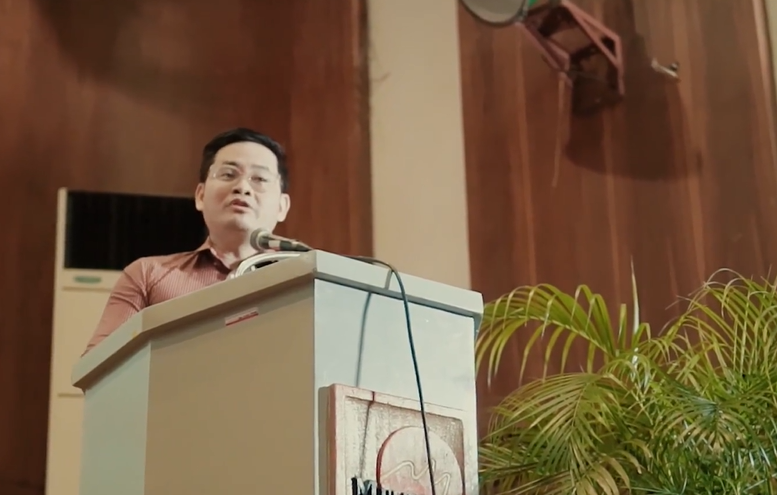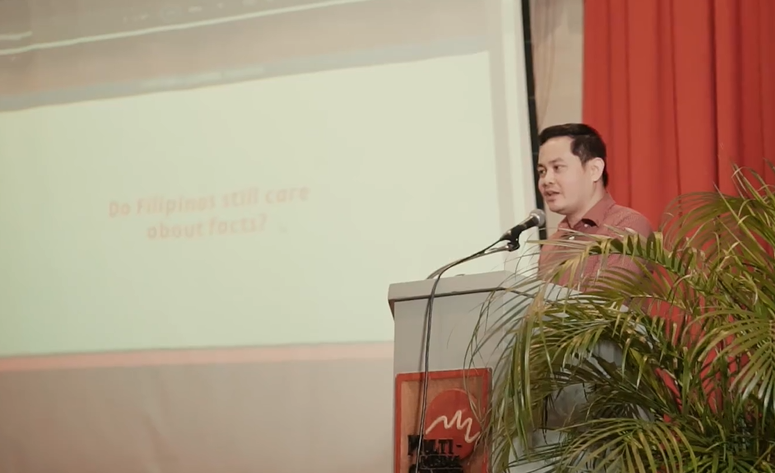
When facts are ignored, ‘thieves can get elected’ —2020 McLuhan fellow

Journalists in the Philippines face the problem of facts being “rewritten or denied,” said Christian Esguerra, veteran political journalist and 2020 Marshall McLuhan Fellow, during the Marshall McLuhan Forum Series in Dumaguete hosted by the Silliman University (SU) College of Mass Communication, February 21, 2023 at the Audio-Visual Theater 1.
In his talk titled, “Democracy at Stake: How Media Battles the Disinformation Phenomenon,” Esguerra discussed the connection between disinformation and democratic processes.
“Everything that actually affects us mostly has to do with political news,” said Esguerra.
‘Relativism on steroids’
“Things are not always what they seem (in politics), and here critical thinking is our friend, but there are unassailable facts long established by hard evidence now being rewritten or denied altogether. And if we, journalists, for instance, try to present them, there’s no assurance that they will be accepted. It’s your facts against theirs; to each his own. I call it relativism on steroids,” said Esguerra.
Journalism, he said, is a discipline that “gathers, examines, and presents facts in proper context” because this is needed to make informed choices in a democracy.
However, journalists are now challenged by an audience that “no longer cares about the facts.”
For example, Esguerra said: “Thieves, in fact, can get elected into office, and instead of questioning the choice or, at least, their shady track record, people question why you’re asking that in the first place. ‘What’s your motive? How sure are you that they are thieves? May napatunayan ba?’” (Has it been proven?)

Journalism ‘under attack’
Disinformation investigation and reporting, said Esguerra, has become important for journalists because journalism and journalists themselves are “under attack.”
“Aside from that widespread disinformation, when you talk about media in the Philippines, you’re also dealing with what we call a culture of impunity… You can always find it easy to hurt someone in the media. You can harass, physically, harass, or even kill members of the media, and most likely you will get away with it,” Esguerra said.
He said independent media are “heavily under siege,” especially under the six-year presidency of Rodrigo Duterte.
“Newsroom and media owners were increasingly under pressure. Everyone was afraid of President Rodrigo Duterte. When he came after Rappler, when he came after the Philippine Daily Inquirer, and then he came after ABS-CBN, what did the other news organizations do? They became even more timid, and that is the worst form of censorship: Self-censorship…And this happened with ABS even before the franchise issue,” he added.
Journalists, said Esguerra, face attacks from all sides, even within the media as they can also be restrained by the conflicting interests of business owners.
Esguerra said he thinks the situation of journalists has not improved because “the climate of fear remains.”
Problem with logic
“Of course, disinformation is the problem, but underlying that also, it is the problem with logic. We don’t operate based on logic anymore. If you notice, to have a credible public discourse, we have to know how to engage, at least at a logical level to minimize fallacies,” said Esguerra.
Education to develop critical thinking among Filipinos also faces challenges, he said, because many Filipinos are not part of the school system and because the basic education in the Philippines has not yet addressed the problem of learning poverty.
A World Bank study released in 2022 assessed that the Philippines has a learning poverty rate of 90.9%, among the highest in the Asian region. Learning poverty is defined as the inability to read and understand a simple text by age 10.
Esguerra is the host of the weekly independent podcast, “Facts First,” which discusses issues in politics and governance with the aim to combat disinformation. He was a reporter for the Philippine Daily Inquirer for 15 years; a political correspondent for ABS-CBN News for five years; and a managing editor and anchor for the ABS-CBN News Channel (ANC) for five years.
Aside from being awarded the Marshall McLuhan Fellowship in 2020, Esguerra also received the Award of Distinction from the Center for Media Freedom and Responsibility and the Titus Brandsma Award for Emergent Leadership in Journalism in 2019.
Esguerra also teaches political reporting and journalism ethics at the University of Santo Tomas and is a researcher at the Research Center for Culture, Arts, and Humanities.
Communication students from SU, Negros Oriental State University, Foundation University, and Saint Paul University Dumaguete attended the forum.
Named after the world-renowned communication theorist, the Marshall McLuhan Fellowship award is a program by the Embassy of Canada in the Philippines that started in 1997.
The Marshall McLuhan Forum Series in Dumaguete is a collaborative project between the Canadian Embassy and the SU College of Mass Communication that has been going on for almost a decade. However, it was suspended for two years during the COVID-19 pandemic.
(With Timothy Deo Libres and Alenah Paulane Ligan, SU College of Mass Communication students; Photos from the Kapunungan sa Mga Mass Communicators Facebook page)


